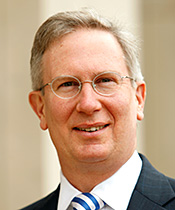By Inclination and Training
Paul G. Mahoney
 |
Lawyers are heavily represented in public life. Partly this is because lawyers are trained to persuade, which is an essential skill in the policy arena. But it is also because lawyers are by inclination and training dedicated to public service. We take great pride in being the first law school explicitly founded on that principle.
The remarkably high representation of UVA Law graduates in national, state, and local elected and appointed office is also a reminder that effective public service depends critically on leadership ability. Our graduates have always become leaders within their organizations, both in the private and public sectors, at rates disproportionate to their numbers. Their ability to work with others—to listen, to understand, to build consensus, and to inspire—make them naturals in the public arena.
Law and lawyers played a central role in the civil rights movement, which celebrates an important anniversary this year. On August 6, 1965, President Johnson signed the Voting Rights Act of 1965, which contained provisions designed to make effective the right to vote as guaranteed by the 15th Amendment. We asked three faculty members whose teaching and scholarship touch on civil rights and in particular on voting rights, Risa Goluboff, Dan Ortiz, and George Rutherglen, to reflect on the Voting Rights Act and the recent Supreme Court decision in the Shelby County case finding a portion of the act unconstitutional.
These pages contain a wealth of interesting observations on issues that should be of interest to every citizen as well as every graduate of the Law School. I hope you enjoy reading them.




